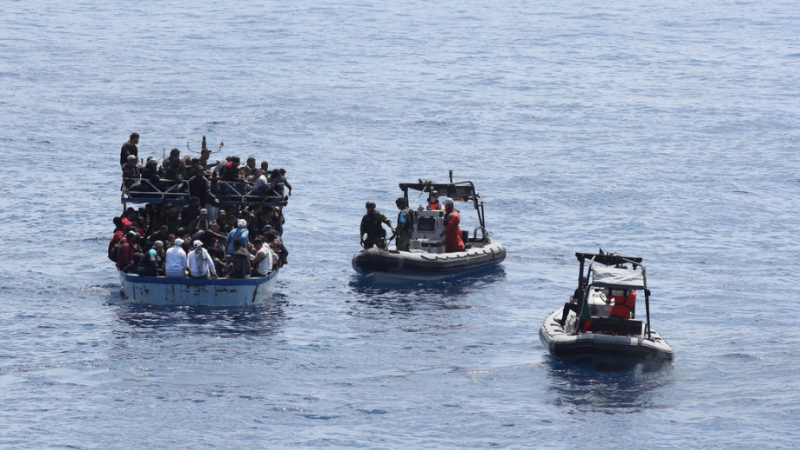Frontex, the border agency of the European Union, is being sued for refusing to provide documents related to its working relations with the Libyan coast guard in Malta’s search and rescue zone in relation to a specific incident in July.
The lawsuit, lodged by the German sea rescue organisation Sea-Watch in cooperation with pro-transparency group FragDenStaat at the EU General Court in Luxembourg, was initiated “to obtain the release of the withheld information in order to prove that Frontex is complicit in Human Rights violations in the Central Mediterranean,” the sea rescue organisation said.
In a press release published on Thursday, Sea-Watch said that the July incident “in violation of international law” occurred within the Maltese search and rescue zone and involved a boat in distress with about 20 people on board being “intercepted by the so-called Libyan Coast Guard and dragged back to Libya”.
The rescue ship Sea-Watch 3 was the closest vessel with rescue capacity but was not informed by any authority, they said.
“Maltese officials refused to fulfill their duty to coordinate rescue efforts and ensure that people in distress at sea were taken to a safe place, as required by international maritime and human rights law. Before the interception of the boat, a Frontex drone was repeatedly on scene and in the vicinity of the distress case. Therefore Frontex must be assumed to have been involved in the pullback in violation of international law”.
Following the incident, FragDenStaat and Sea Watch had filed requests to access Frontex documents, under the Freedom of Information Regulation, in order to learn more about Frontex’s involvement in that incident, however the border agency “repeatedly refused to release the requested information,” they said.
“What Frontex disclosed is the amount of data available, but not its content: 73 documents, footage and one video were identified that relate to the date of the Sea-Watch request. Among them were 36 documents on the exchange of communications between Frontex and Libyan, Italian, and Maltese authorities on that specific day alone.”
We're joining @seawatchcrew to take Frontex to court.
We will fight for information that proves how, in the Central Mediterranean, EU border police #Frontex is instrumental in human rights abuses. https://t.co/B8M5ZlFUoV
— FragDenStaat.de (@fragdenstaat) April 28, 2022
“Frontex has a legal obligation to be transparent about its operations — and yet the border agency systematically denies access to information about its actions, in the Central Mediterranean and elsewhere. This is a dangerous pattern. Without transparency we cannot hold Frontex accountable, creating breeding ground for impunity and further abuse,’ Luisa Izuzquiza from FragDenStaat said.
Investigation reveals Frontex responsible for push backs of 957 asylum seekers
In a separate investigative report published on Thursday, the same agency has been revealed to have been involved in the push backs of at least 957 asylum seekers in the Aegean Sea between March 2020 and September 2021.
In the report, it was revealed that Frontex, the “EU’s best-funded agency with a budget of €758m” was involved with “what appear to be pushbacks, according to its own database”.
The joint investigation was carried out by The Guardian, Lighthouse Reports, Der Spiegel, SRF Rundschau, Republik and Le Monde.
A freedom of information request (FOI) filed in the investigation found that the agency’s internal incident report database, ‘Jora’, recorded sights of asylum seeker push backs in the Aegean being labelled by officials as “prevention of departure,” a report by The Guardian explains.
The Frontex guidelines define this as an incident when migrants are stopped at sea by non-European country authorities in their territorial waters and sent back to their point of departure, it says.
In response to the FOI request, the agency provided a redacted version of the database but included descriptions of 145 cases labelled “prevention of departure,” which differed from reports of the same incidents by the Turkish coastguard, witnesses, leaked documents and other confidential sources, when cross-referenced, according to the report.
Through their research, the investigators concluded that “in at least 22 incidents, asylum seekers were taken off dinghies, put into Greek life rafts and left adrift at sea”.
Giving one example of such a pushback, the report highlights one incident in May 2021, where a group of some 50 asylum seekers, already ashore in Lesbos (Greece), had contacted a Norwegian NGO, Aegean Boat Report, and sent them photos and a WhatsApp message showing their location near Mytilene (Lesbos’ capital).
However, hours later, some of the group “were found by the Turkish coastguard at sea in orange life rafts”. “This case was later recorded in the Frontex database as a ‘prevention of departure’,” the report reveals.
Greece and Frontex deny allegations of pushbacks and say their officials comply with human rights legislation.
Pushbacks, illegal under EU law, are not new to Malta. In 2020, Maltese authorities reportedly conducted pushback practices, such as an incident leading to the collective expulsion at sea of 51 migrants via private vessels, and to the death of 12 migrants, reportedly due to the delay of search and rescue operations.













